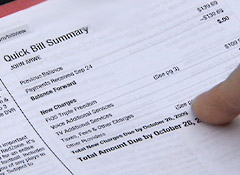Sign In

Menu
Suggested Searches
Recent Searches
Suggested Searches
Product Ratings
Resources
Chat With AskCR
Resources
All Products A-ZThe payment for your account couldn't be processed or you've canceled your account with us.
Re-activateMy account
Sign In
My account
Sign In


For the fourth time in 14 years, the Federal Trade Commission has taken action against the nation's largest charge-it-to-your-phone-bill company, Billing Services Group (BSG), for alleged "cramming," or placement of unauthorized charges on consumers' phone bills.
You've probably never heard of BSG, because it identifies itself on phone bills by other names, including ACI, ESBI, HBS, OAN, USBI, and ZPDI. These codes represent different types of transactions that can be billed to your phone bill, such as enhanced telephone services or digital downloads. BSG's website posts so-called "Consumer Protection FAQs" to explain what these codes represent. We first unraveled the mystery in 2010 after a New York resident complained to us about $31 in unauthorized charges on his phone bills cryptically coded as "OAN."
Now, the FTC alleges that BSG, a Bermuda corporation, placed more than $70 million in unauthorized "cramming" charges on 1.2 million consumers' phone bills in violation of a 1999 court order and settlement, which prohibited it from engaging in unauthorized billing and misrepresentations to consumers. The billed services included identity theft protection, voicemail, streaming video, and directory assistance, the FTC said.
According to the FTC's federal court request for a civil contempt ruling, BSG billed consumers for unauthorized services on behalf of "known crammer Cindy Landeen," formerly of Phonebillit, a one-time BSG client that frequently received more complaints than phone companies allow, and whose billing privileges were suspended by PAC Bell in 2002 and Bell South in 2003.
The FTC motion "represents an incomplete and inaccurate representation of the facts and leaps to false conclusions," says BSG in a prepared statement. "The FTC is trying to blame BSG for the acts of another party," the statement continues.
That's reminiscent of BSG's position on its inclusion as a defendant in another FTC cramming case in 2006 against Nationwide Connections, which bilked consumers out of $34 million. BSG asserted that it "bears no responsibility for the fraudulent actions" of Nationwide and was itself "a victim of Nationwide's fraud." Nevertheless, while admitting no wrongdoing, BSG paid $1.9 million in consumer redress to settle that case with the FTC in 2008.
"BSG made it possible for con artists to steal people's hard-earned money by placing charges on phone bills for services they never ordered or used," said David Vladeck, director of the FTC's Bureau of Consumer Protection. "Under previous federal court orders, BSG cannot profit from the fraud of others and then deny responsibility for the harm they made possible."
The FTC is asking the court to make BSG pay more than $52.6 million, which is what the company billed consumers and failed to refund.
BSG counters that it works hard to stop crammers by reviewing and monitoring the third-party service providers it works with, and by monitoring consumer complaints. BSG also operates the "public service" website KnowYourPhoneBill.org, which advises consumers who find suspicious charges to call the merchant who may have crammed them. (We don't think you should trust the fox to guard the chicken coop; instead, call your phone company and demand that the mystery charges be refunded and stopped.)
The FTC filing, however, documents a different story, including a large volume of billing complaints—18,000 for the ID theft protection service, 52,500 for the directory assistance service, and 65,000 for the streaming video service. The voice mail service had a 60 percent refund request rate. And AT&T and Verizon eventually barred MyIproducts, one of the voicemail brands, from billing their customers.
Another sign of trouble can be found in BSG's financial statements in the wake of a 2010 crackdown on cramming by phone companies, government investigators, and consumers. BSG's operating revenue last year was down 34 percent from 2009, while profits have collapsed 99 percent to a mere $189,000.
—Jeff Blyskal
 Build & Buy Car Buying Service
Build & Buy Car Buying Service
Save thousands off MSRP with upfront dealer pricing information and a transparent car buying experience.
 Get Ratings on the go and compare
Get Ratings on the go and compare
while you shop